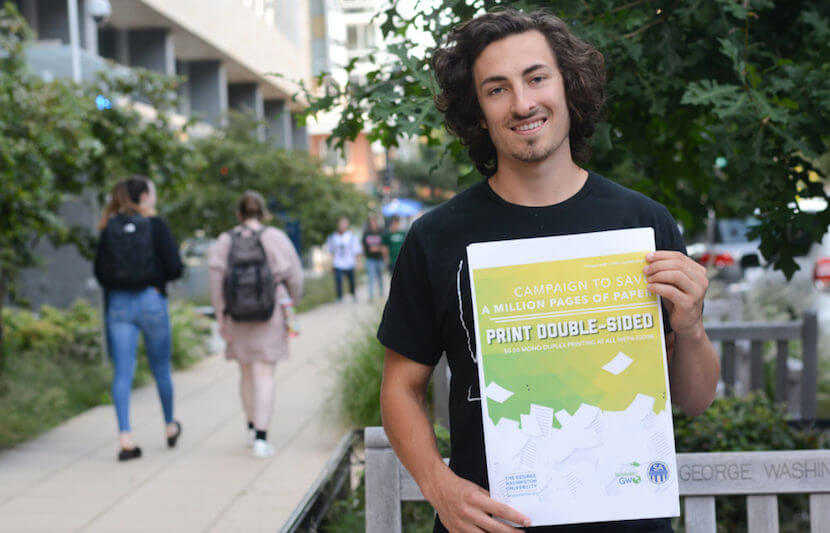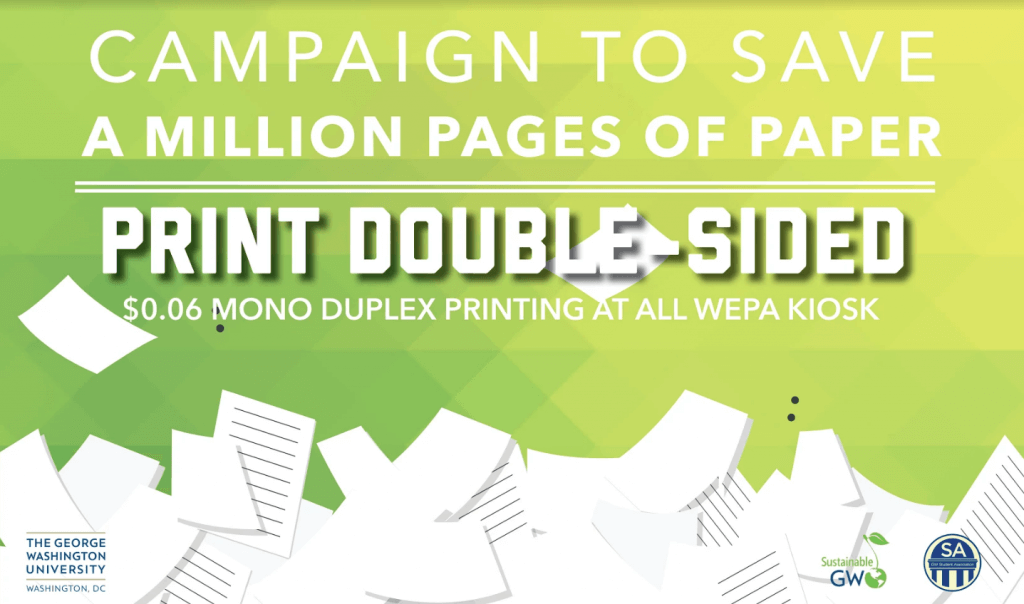The Student Association (SA) at The George Washington University (GW) has launched a campaign to save 1 million pieces of paper by next summer at the behest of Logan Malik, a senior and SA’s director of sustainability policy. The campaign kicked off on September 10, and will run through June 2018.
The “Save a Million” campaign calls for students to limit their printing to what’s absolutely essential and also to print on both sides of the paper.
Malik believes that the initiative would save about 60 percent of paper if students followed through with the restrictions. He predicts that an increase of 20 percent in double-sided printing at WEPA printers would result in saving 600,000 pieces of paper, as compared to fiscal year 2016. (GW’s fiscal year runs from July 1 to June 30.) So his push to save a million pieces of paper would be a reach, but he believes the target is feasible.
Malik has divided the campaign into phases and planned the steps for each phase.
His first priority is to raise awareness among students. His advertising plans include: visiting classrooms; encouraging students to join the campaign; hanging posters made entirely with recycled paper; using SA email blasts; coordinating advertisements on university printers with Academic Technologies (a company that controls the university’s contract with WEPA) and WEPA; and recruiting SA senators to take up the cause. Quarterly WEPA reports on paper usage will help him keep track of the campaign’s progress.
Later in the semester, Malik will shift his focus to faculty and staff who don’t use WEPA printers to convince them to take up the cause.
He also plans on exploring GW’s contracts with printing companies, such as Xerox, Ricoh and Canon, to have them track paper usage on campus photocopying and other purposes.
“The George Washington University Office of Sustainability is thrilled that the Student Association is launching the ‘Save a Million’ campaign to save a million pieces of paper by the end of the fiscal year,” said Meghan Chapple, director of Office of Sustainability.
“We will continue to support Logan [Malik] and the SA in their important efforts that will enhance GW’s sustainability efforts, benefiting GW and the environment.”
The University Network (TUN) spoke with Malik to find out more about him and what inspired him to choose saving paper as his cause.
Malik’s background
Malik is a senior majoring in chemistry with a double minor in chemistry and sustainability. As a member of GW’s Laser Analytics Lab in the Department of Chemistry, he has been researching issues related to climate change and environmental degradation.
“I am currently involved in two projects: Light Field Imaging Tomography and the Luftsinn Carbon Dioxide Sensing Network,” said Malik.
“The first is the creation of a new diagnostic method for detecting environmentally harmful chemical compounds in combustion reactions. The second involves building a network of low-cost NDIR carbon dioxide sensors that are accurate and precise enough to provide a valuable tool for assessing carbon emissions from the District of Columbia.”
Earlier this year, Malik won GW’s Eco-Equity Challenge.
“As the winner of the Eco-Equity Award, my role in this project is to install 12 sensors in high schools throughout low income and minority communities while engaging high school students on issues of climate change and introducing them to the technology used in the sensors,” he said.
Malik’s commitment to environmental issues doesn’t stop at the lab. He has served in leadership roles in various student organizations, including Green GW and Fossil Free GW. In November 2016, he helped organize GW students’ “walkout” and march to the White House in protest of President-Elect Donald Trump and also helped shape the list of demands presented to university leaders for the protection of marginalized students.
Malik is also leading the effort to push GW to divest from fossil fuel investments. He authored “The George Washington University Fossil Fuel Divestment Resolution,” which was passed unanimously by SA leaders and signed by the SA president. He is vocal about the issue.
Inspiration for “Save a Million”
The campaign to Save a Million was inspired by Malik’s initiative to change the pricing of printing on campus and obtaining a discount for double-sided printing when he was elected as undergraduate-at-large senator.
“I was initially inspired to change the pricing of printing as a Senator because I did the research and saw the potential impact that a small change in pricing could make on the amount of waste that the GW community generates,” he said.
“In the fiscal year of 2012, the GW community used over 20,300,000 pages of paper. In 2016, the student body alone used 3,200,000 pages of paper.”
The initiative’s success then led Malik to create the “Save a Million” campaign.
“Now that the price change has been implemented and students have an incentive to be mindful of their printing practices, I wanted to bring their attention to the potential impact they could have by making the simple behavioral change to print double-sided,” he said.
Malik believes that individual campaigns to raise awareness of environmental issues are crucial for the development of sound environmental policies.
“[A] campaign like this is valuable because it encourages students to think about how their actions impact the environment and climate change,” he said.
“While small behavioral changes are not going to save our world from the effects of climate change, they can be a stepping stone to necessary systematic and institutional changes by engaging people in the problem and increasing awareness.”
What the campaign means to Malik
Malik’s “passion” is environmental sustainability and fighting climate change, and he wants to be an advocate for change within GW to limit its impact on the environment. The “Save a Million” campaign is a way for him to engage students on these issues of sustainability and show the community that “sustainability can, and should, be a priority for all people who are interested in public service both in college and beyond.”
The campaign will also allow him to make a measurable impact in the GW community.
“While I am passionate and motivated to address the institutional problems that have an impact on the environment, such as GW’s investment in fossil fuels, I also think it is important to recognize that some things as trivial as double-sided printing can make a big difference,” said Malik.
“If we succeed in our campaign, we will save approximately 125 trees, 95,000 gallons of water, and 56,000 kilowatts of energy. I do not view that as a small feat, and I think putting time and energy into working to do that is valuable.”




